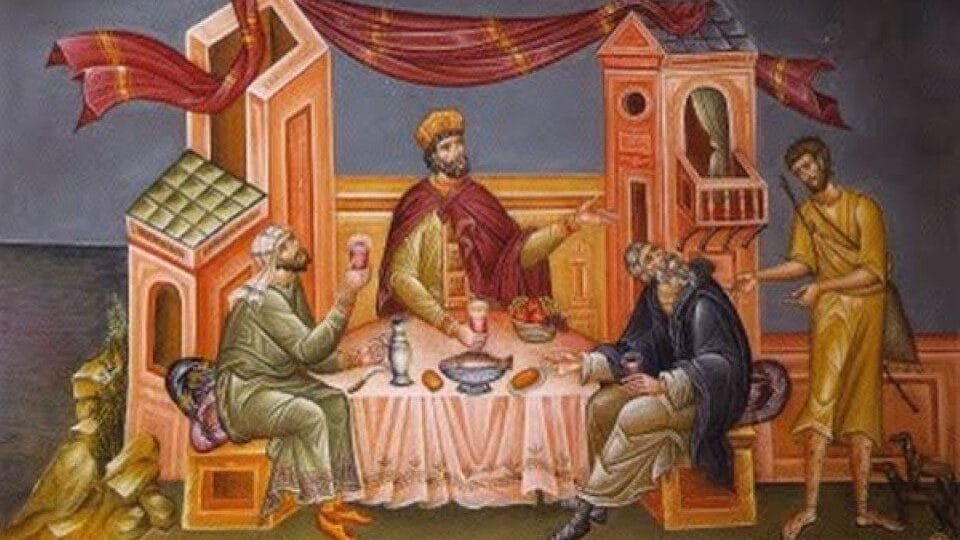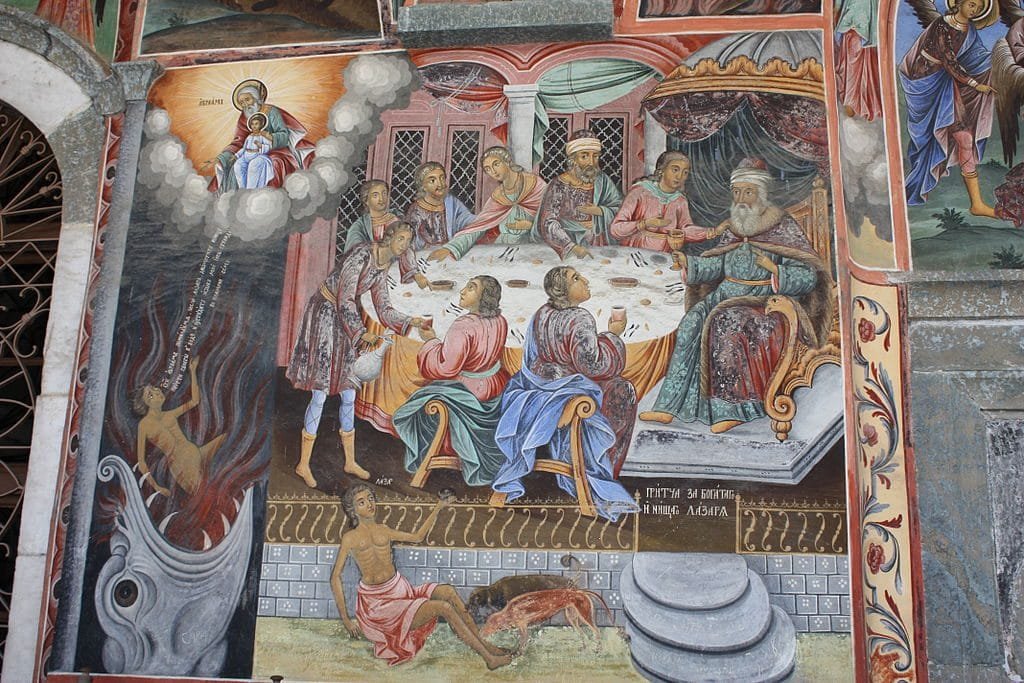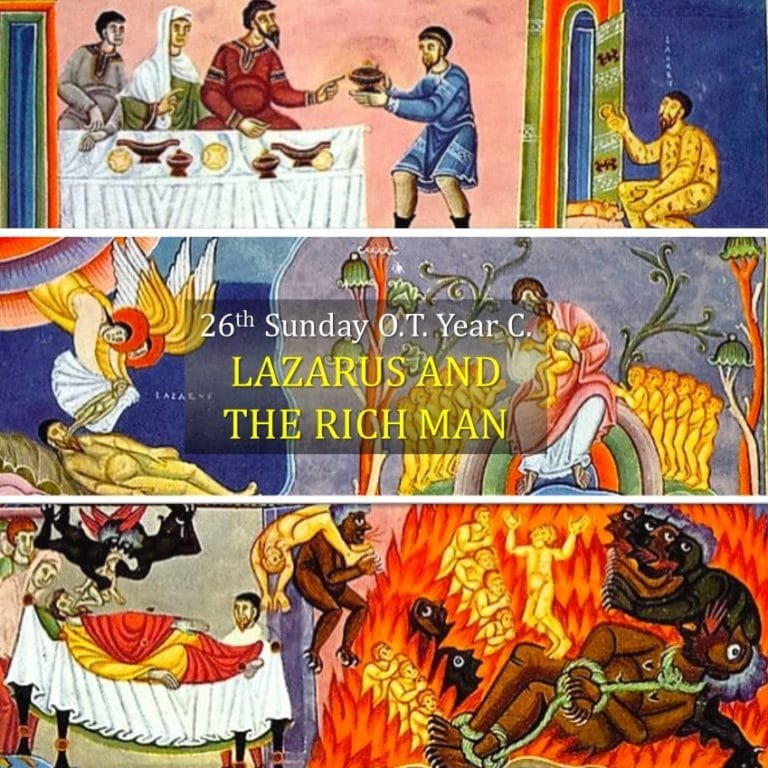POPE FRANCIS ON THE 26TH SUNDAY IN ORDINARY TIME C

HOMILY OF POPE FRANCIS
Saint Peter’s Square
26th Sunday in Ordinary Time C
29 September 2019
Today’s Responsorial Psalm reminds us that the Lord upholds the stranger as well as the widow and the orphan among his people. The Psalmist makes explicit mention of those persons who are especially vulnerable, often forgotten and subject to oppression. The Lord has a particular concern for foreigners, widows and orphans, for they are without rights, excluded and marginalized. This is why God tells the Israelites to give them special care.
In the Book of Exodus, the Lord warns his people not to mistreat in any way widows and orphans, for he hears their cry (cf. 22:23). Deuteronomy sounds the same warning twice (cf. 24:17; 27:19), and includes strangers among this group requiring protection. The reason for that warning is explained clearly in the same book: the God of Israel is the one who “executes justice for the fatherless and the widow, and loves the sojourner, giving him food and clothing” (10:18). This loving care for the less privileged is presented as a characteristic trait of the God of Israel and is likewise required, as a moral duty, of all those who would belong to his people.
That is why we must pay special attention to the strangers in our midst as well as to widows, orphans and all the outcasts of our time. In the Message for this 105th World Day of Migrants and Refugees, the theme “It is not Just about Migrants” is repeated as a refrain. And rightly so: it is not only about foreigners; it is about all those in existential peripheries who, together with migrants and refugees, are victims of the throwaway culture. The Lord calls us to practise charity towards them. He calls us to restore their humanity, as well as our own, and to leave no one behind.
Along with the exercise of charity, the Lord also invites us to think about the injustices that cause exclusion – and in particular the privileges of the few, who, in order to preserve their status, act to the detriment of the many. “Today’s world is increasingly becoming more elitist and cruel towards the excluded”: this is a painful truth; our word is daily more and more elitist, more cruel towards the excluded. “Developing countries continue to be drained of their best natural and human resources for the benefit of a few privileged markets. Wars only affect some regions of the world, yet weapons of war are produced and sold in other regions which are then unwilling to take in the refugees generated by these conflicts. Those who pay the price are always the little ones, the poor, the most vulnerable, who are prevented from sitting at the table and are left with the ‘crumbs’ of the banquet” (Message for the 105th World Day of Migrants and Refugees).
It is in this context that the harsh words of the Prophet Amos proclaimed in the first reading (6:1.4-7) should be understood. Woe to those who are at ease and seek pleasure in Zion, who do not worry about the ruin of God’s people, even though it is in plain sight. They do not notice the destruction of Israel because they are too busy ensuring that they can still enjoy the good life, delicious food and fine drinks. It is striking how, twenty-eight centuries later, these warnings remain as timely as ever. For today too, the “culture of comfort… makes us think only of ourselves, makes us insensitive to the cries of other people… which results in indifference to others; indeed, it even leads to the globalization of indifference” (Homily in Lampedusa, 8 July 2013).
In the end, we too risk becoming like that rich man in the Gospel who is unconcerned for the poor man Lazarus, “covered with sores, who would gladly have eaten his fill of the scraps that fell from the rich man’s table” (Lk 16:20-21). Too intent on buying elegant clothes and organizing lavish banquets, the rich man in the parable is blind to Lazarus’s suffering. Overly concerned with preserving our own well-being, we too risk being blind to our brothers and sisters in difficulty.
Yet, as Christians, we cannot be indifferent to the tragedy of old and new forms of poverty, to the bleak isolation, contempt and discrimination experienced by those who do not belong to “our” group. We cannot remain insensitive, our hearts deadened, before the misery of so many innocent people. We must not fail to weep. We must not fail to respond. Let us ask the Lord for the grace of tears, the tears that can convert our hearts before such sins.
If we want to be men and women of God, as Saint Paul urges Timothy, we must “keep the commandment unstained and free from reproach until the appearing of our Lord Jesus Christ” (1 Tm 6:14). The commandment is to love God and love our neighbour; the two cannot be separated! Loving our neighbour as ourselves means being firmly committed to building a more just world, in which everyone has access to the goods of the earth, in which all can develop as individuals and as families, and in which fundamental rights and dignity are guaranteed to all.
Loving our neighbour means feeling compassion for the sufferings of our brothers and sisters, drawing close to them, touching their sores and sharing their stories, and thus manifesting concretely God’s tender love for them. This means being a neighbour to all those who are mistreated and abandoned on the streets of our world, soothing their wounds and bringing them to the nearest shelter, where their needs can be met.
God gave this holy commandment to his people and sealed it with the blood of his Son Jesus, to be a source of blessing for all mankind. So that all together we can work to build the human family according to his original plan, revealed in Jesus Christ: all are brothers and sisters, all are sons and daughters of the same Father.
Today we also need a mother. So we entrust to the maternal love of Mary, Our Lady of the Way, of so many painful journeys, all migrants and refugees, together with those who live on the peripheries of our world and those who have chosen to share their journey.
Source: https://www.vatican.va/content/francesco/en/homilies/2019/documents/papa-francesco_20190929_omelia-migranti.html
Emphasis mine.

HOMILY OF HIS HOLINESS POPE FRANCIS
Saint Peter’s Square
26th Sunday in Ordinary Time C, 25 September 2016
In the second reading the Apostle Paul offers to Timothy, but also to us, some advice which is close to his heart. Among other things, he charges him “to keep the commandment unstained and free from reproach” (1 Tim 6:14). He speaks simply of a commandment. It seems that he wants to keep our attention fixed firmly on what is essential for our faith. Saint Paul, indeed, is not suggesting all sorts of different points, but is emphasizing the core of the faith. This centre around which everything revolves, this beating heart which gives life to everything is the Paschal proclamation, the first proclamation: the Lord Jesus is risen, the Lord Jesus loves you, and he has given his life for you; risen and alive, he is close to you and waits for you every day. We must never forget this. On this Jubilee for Catechists, we are being asked not to tire of keeping the key message of the faith front and centre: the Lord is risen. Nothing is more important; nothing is clearer or more relevant than this. Everything in the faith becomes beautiful when linked to this centrepiece, if it is saturated by the Paschal proclamation. If it remains in isolation, however, it loses its sense and force. We are called always to live out and proclaim the newness of the Lord’s love: “Jesus truly loves you, just as you are. Give him space: in spite of the disappointments and wounds in your life, give him the chance to love you. He will not disappoint you”.
The commandment which Saint Paul is speaking of makes us think also of Jesus’ new commandment: “that you love one another as I have loved you” (Jn 15:12). It is by loving that the God-who-is-Love is proclaimed to the world: not by the power of convincing, never by imposing the truth, no less by growing fixated on some religious or moral obligation. God is proclaimed through the encounter between persons, with care for their history and their journey. Because the Lord is not an idea, but a living person: his message is passed on through simple and authentic testimony, by listening and welcoming, with joy which radiates outward. We do not speak convincingly about Jesus when we are sad; nor do we transmit God’s beauty merely with beautiful homilies. The God of hope is proclaimed by living out the Gospel of love in the present moment, without being afraid of testifying to it, even in new ways.
This Sunday’s Gospel helps us understand what it means to love, and more than anything how to avoid certain risks. In the parable there is a rich man who does not notice Lazarus, a poor man who was “at his gate” (Lk 16:20). This rich man, in fact, does not do evil towards anyone; nothing says that he is a bad man. But he has a sickness much greater than Lazarus’, who was “full of sores” (ibid.): this rich man suffers from terrible blindness, because he is not able to look beyond his world, made of banquets and fine clothing. He cannot see beyond the door of his house to where Lazarus lies, because what is happening outside does not interest him. He does not see with his eyes, because he cannot feel with his heart. For into it a worldliness has entered which anaesthetizes the soul. This worldliness is like a “black hole” that swallows up what is good, which extinguishes love, because it consumes everything in its very self. And so here a person sees only outward appearances, no longer noticing others because one has become indifferent to everyone. The one who suffers from grave blindness often takes on “squinting” behaviour: he looks with adulation at famous people, of high rank, admired by the world, yet turns his gaze away from the many Lazaruses of today, from the poor, from the suffering who are the Lord’s beloved.
But the Lord looks at those who are neglected and discarded by the world. Lazarus is the only one named in all of Jesus’ parables. His name means “God helps”. God does not forget him; he will welcome him to the banquet in his kingdom, together with Abram, in communion with all who suffer. The rich man in the parable, on the other hand, does not even have a name; his life passes by forgotten, because whoever lives for himself does not write history. And a Christian must write history! He or she must go out from themselves, to write history! But whoever lives for themselves cannot write history. Today’s callousness causes chasms to be dug that can never be crossed. And we have fallen, at this time, into the sickness of indifference, selfishness and worldliness.
There is another detail in the parable, a contrast. The opulent life of this nameless man is described as being ostentatious: everything about him concerns needs and rights. Even when he is dead he insists on being helped and demands what is to his benefit. Lazarus’ poverty, however, is articulated with great dignity: from his mouth no complaints or protests or scornful words issue. This is a valuable teaching: as servants of the word of Jesus we have been called not to parade our appearances and not to seek for glory; nor can we be sad or full of complaints. We are not prophets of gloom who take delight in unearthing dangers or deviations; we are not people who become ensconced in our own surroundings, handing out bitter judgments on our society, on the Church, on everything and everyone, polluting the world with our negativity. Pitiful scepticism does not belong to whoever is close to the word of God.
Whoever proclaims the hope of Jesus carries joy and sees a great distance; such persons have the horizon open before them; there is no wall closing them in; they see a great distance because they know how to see beyond evil and beyond their problems. At the same time, they see clearly from up close, because they are attentive to their neighbour and to their neighbour’s needs. The Lord is asking this of us today: before all the Lazaruses whom we see, we are called to be disturbed, to find ways of meeting and helping, without always delegating to others or saying: “I will help you tomorrow; I have no time today, I’ll help you tomorrow”. This is a sin. The time taken to help others is time given to Jesus; it is love that remains: it is our treasure in heaven, which we earn here on earth.
And so, dear catechists, dear brothers and sisters, may the Lord give us the grace to be renewed every day by the joy of the first proclamation to us: Jesus died and is risen, Jesus loves us personally! May he give us the strength to live and proclaim the commandment of love, overcoming blindness of appearances, and worldly sadness. May he make us sensitive to the poor, who are not an afterthought in the Gospel but an important page, always open before all.
Source: https://www.vatican.va/content/francesco/en/homilies/2016/documents/papa-francesco_20160925_omelia-giubileo-catechisti.html
Emphasis mine.
Stay updated: subscribe by email for free TO OUR NEW WEBSITE www.catholicsstrivingforholiness.org (PUT YOUR EMAIL IN THE SUBSCRIBE WIDGET).
We are also in www.fb.com/Catholicsstrivingforholiness. Kindly help more people in their Christian life by liking our page and inviting your family, friends and relatives to do so as well. Thanks in advance and God bless you and your loved ones! Fr. Rolly Arjonillo

